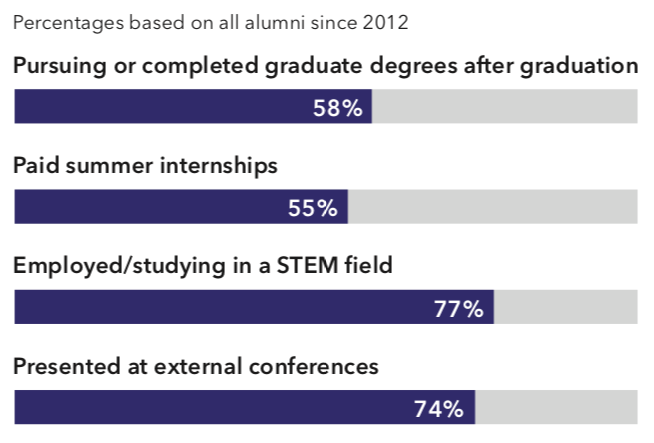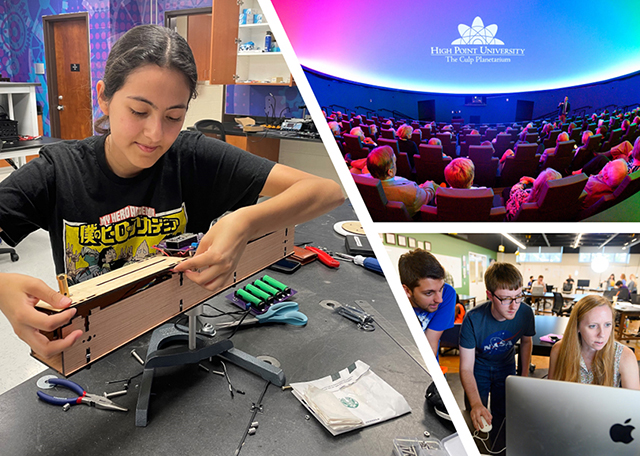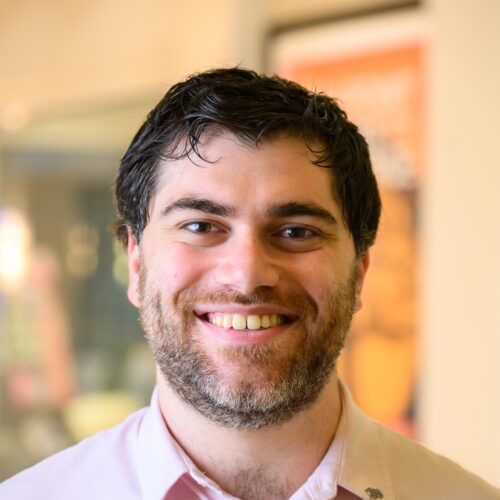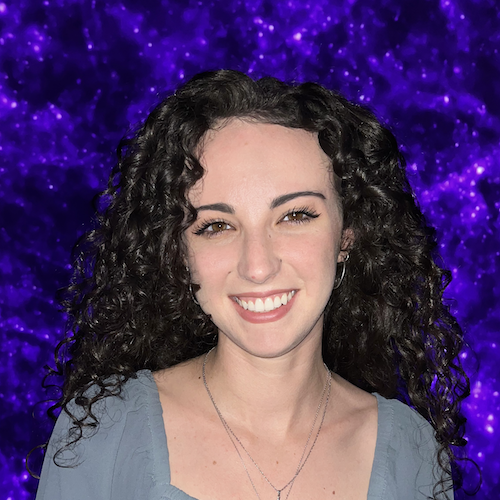With a makerspace and machine shop, advanced instrumentation, and the Culp Planetarium, physics majors at High Point University have extensive opportunities to grow as creative, critical thinkers well-prepared for their next steps.
With a makerspace and machine shop, advanced instrumentation, and the Culp Planetarium, physics majors at High Point University have extensive opportunities to grow as creative, critical thinkers well-prepared for their next steps.
Undergraduate research, public outreach, summer internships, publications, and R&D projects…there’s a lot going on in the Department of Physics at High Point University. We invite you to browse our website, course materials, and photo galleries. But if you really want to know what we are about, we encourage you to come to campus and spend time with our faculty, our physics majors, and our alumni. We love to talk physics and astronomy, and we love to show you our results.
Dr. Jacob Brooks ([email protected])
Interim Chair and Assistant Professor, Department of Physics
(336) 841-9755
Upon graduation you will be well-prepared for a wide variety of pursuits. If you choose graduate school, an undergraduate degree in physics is excellent preparation for graduate studies in a number of fields including astronomy, earth and atmospheric science, biophysics, mathematics, mechanical engineering, electrical engineering, and nuclear engineering, to name just a few. Students have also gone on to graduate programs in law and medicine, as a physics undergraduate degree teaches you strong critical thinking and logical reasoning skills.
If you are looking to enter the workforce right after graduation, your degree will open up a range of possibilities. Physics graduates work in such diverse fields as engineering, computer or information systems, medical technology, technical writing, finance, and education.
Depending on your interests, you may want to consider double-majoring while at HPU. For example, if you want to go into biophysics, you should take courses in general chemistry, organic chemistry, biochemistry, and biology. If you want to go into high-performance computing or do computational physics, consider double-majoring in computer science. If theory is your thing, then double major in mathematics.
With strong problem solving skills and theoretical understanding, experience in designing and carrying out experiments, and extensive application of computational modeling and computer programming, our graduates are prepared for a variety of careers and graduate programs in science that are as diverse as our students themselves.
Traditional areas: physics, engineering, atmospheric science, nanotechnology, microelectronics, computer programming and technology, instrumentation, materials science, astrophysics, biophysics and medical physics.
Non-traditional areas: teaching, medicine, finance or law.
Your Mission (…should you choose to accept it)
Your principal objective as a scientist is to seek answers to interesting questions. Your principal objective as a student is to learn the tools required for discovery — problem solving, fundamental physics, experimental methods, computational modeling, mathematics, and communication. Through classes, laboratory experiences, and undergraduate research, you will develop a scientific skill set with expertise in a wide variety of areas.
Upon completing the Physics Program at High Point University, you will understand how to:
- Design Experiments and analyze data.
- Solve problems and reason analytically.
- Work with electronics and instrumentation.
- Perform computational modeling.
- Prepare scientific articles and research proposals.
- Present research orally and through poster presentations.
- Answer fundamental questions in theoretical physics related to Classical Mechanics, Quantum Mechanics, Electricity and Magnetism, and Statistical Mechanics/Thermodynamics.
The objectives above can be simplified into four broad categories: theoretical analysis, experimental analysis, computational modeling, and communication.
The core values that distinguish the Physics program at High Point University are:
1. Creative and contemporary teaching that incorporates modern physics from the first day of the first year
While understanding classical physics is vital, it is modern physics (i.e. twentieth century physics) that leads scientists to investigate the expansion of the Universe and dark energy, the creation of black holes from stellar collapse, and the existence of quarks, the basic building blocks of protons, neutrons, and other sub-atomic particles. As a result, we weave modern physics into the first-year introductory calculus-based physics sequence called Fundamentals of Physics, making your introduction to physics exciting, relevant, and purposefully different from what you learn in high school physics.
In Physics, we believe you learn best by doing. We work to integrate lectures and labs so you can explore a new concept experimentally before hearing about it in lecture. We have created cutting-edge physics experiments in video analysis and gel electrophoresis. In addition, we have developed an innovative freshman course in Research and Scientific Writing where freshman physics majors begin doing undergraduate research in the first year.
2. Computational modeling and computer programming
Computational modeling is essential to every scientific and engineering discipline today. From understanding galactic evolution to predicting the path of a hurricane, scientists develop and test computational models in order to understand complex systems. Our physics program seeks to be a national leader in teaching and using computational modeling in all of our courses. In your first year as a physics major, you will create physics simulations in Python and learn to write MATLAB for data analysis. In the sophomore year, you will learn LabView and Arduino for data collection and instrument control, and in the junior and senior years, you will use Easy Java Simulations and Python to develop more complex models.
3. Undergraduate research
Research experience as an undergraduate molds you into a scientist. It builds your resume, opens up opportunities for employment or graduate school, and sets you apart from other students who merely take courses.
Undergraduate research begins in the freshman year with a year-long sequence called Research and Scientific Writing in Physics where students learn the tools of scientific inquiry and begin an independent project with a faculty mentor. We are one of the few programs in the country that offers such a course. Research culminates in the junior (and/or senior) year with a more in-depth, year-long research project with a faculty mentor.
The freshman research experience makes our students competitive when applying for paid summer research experiences like the NSF REU (National Science Foundation Research Experiences for Undergraduates) program or NASA MUST program. We expect all of our sophomores and juniors to apply for summer research programs. In some cases, even our freshmen have been accepted to these highly competitive programs, partly because of their early research experience at HPU.
Dr. Sobotka was featured in UNC’s “The Well”
HPU Students Present Impressive Summer Research
HPU Students Conduct Compelling Summer Research with Faculty
HPU Students and Faculty Share Science Fun at Qubein Children’s Museum
HPU Students Present Innovative Research at Annual Symposium
L. Ni, Y. Jin, Z. H. Li, K. W. Brown, H. Hua, C. Y. Niu, A. K. Anthony, J. Barney, R. J. Charity, et al.Resonant structure of 18Na and the N = 8 shell. Physical Review C. 112, 024321 (2025).
L. Ni, Y. Jin, Z.H. Li, K.W., H. Hua, C.Y. Niu, J.G. Li, A.K. Anthony, J. Barney, et al. Observation of three-proton-decaying resonant states in 21Al. Physics Letters B. 868, 139660 (2025).
P. Dey, A. K. Anthony, C. Hunt, M. P. Kuchera, R. Ramanujan, W. G. Lynch, M. B. Tsang, J. M. Wieske, J. W. Ajongbah, S. Beceiro-Novo, K. W. Brown, Z. Chajecki, K. J. Cook, S. Gangestad*, T. Ginter, B. Kendziorski, F. C. E. Teh, H. Wong. Point-cloud based machine learning for classifying rare events in the Active-Target Time Projection Chamber. Nucl. Instrum. Methods Phys. Res. A, 1072, 170002 (2025).
*Undergraduates at HPU
In their first or second year, majors take a year-long course in undergraduate research where they complete an independent research project with a faculty member. Additionally in their first year, physics majors are taught the programming language Python in introductory, calculus-based physics. Through the Matter & Interactions curricula, majors learn both computational modeling and numerical problem solving.
Every physics course includes at least two of the following experiential learning components in which students apply what they are learning, develop critical thinking skills, and demonstrate problem solving:
- Experimental physics (laboratory)
- Computational modeling
- A culminating project that is theoretical, experimental, or computational.

| Degree Requirements | Credits |
|---|---|
| Major Requirements | 48 |
| University Core Requirements | 36-44 |
| Electives | 36-44 |
| Total | 128 |
| Degree Requirements | Credits |
|---|---|
| Major Requirements | 62 |
| University Core Requirements | 36-44 |
| Electives | 22-30 |
| Total | 128 |
| Course | Course Title | Credits |
|---|---|---|
| CSC 1710 | Introduction to Programming | 4 |
| PHY 2010 | Fundamentals of Physics I | 4 |
| PHY 2020 | Fundamentals of Physics II | 4 |
| PHY 2030 | Modern Physics | 4 |
| Complete all courses falling in either the Pure Mathematics or the Applied Mathematics track. Pure Mathematics*: |
||
| MTH 1410 | Calculus I | 4 |
| MTH 1420 | Calculus II | 4 |
| MTH 2310 | Linear Algebra | 4 |
| MTH 2410 | Calculus III | 4 |
| MTH 3410 | Differential Equations | 4 |
| Applied Mathematics** | ||
| MTH 1410 and MTH 1420 | Calculus Iand Calculus II | 4 |
| OR | ||
| MTH 1415 and MTH 1425 | Mathematics for Engineers I and Mathematics for Engineers II | 4 |
| AND | ||
| MTH/PHY 2050 | Mathematical Methods in Engineering and Physics I | 4 |
| MTH/PHY 2150 | Mathematical Methods in Engineering and Physics II | 4 |
| PHY 2200 | Computational Physics | 4 |
| Select three PHY electives from the following list:*** | ||
| PHY 2100 | Electronics | 4 |
| PHY 2200 | Computational Physics | 4 |
| PHY 3110 | Classical Mechanics | 4 |
| PHY 3210 | Electromagnetism | 4 |
| PHY 3310 | Quantum Mechanics | 4 |
| PHY 3400 | Statistical and Thermal Physics | 4 |
| PHY 3500 | Biological Physics | 4 |
| PHY 3600 | Optics | 4 |
| PHY 3700 | Modern Astrophysics | 4 |
| Course Descriptions | ||
**The Applied Math option is especially appropriate for students majoring in physics or double majoring in physics and computer science or physics and engineering.
***Two of these electives must come from PHY 3110, PHY 3210, PHY 3310, and PHY 3400. If completing the Applied Mathematics track, PHY 2200 may not be used to satisfy elective requirements.
| Course | Course Tile | Credits |
|---|---|---|
| CSC 1710 | Introduction to Programming | 4 |
| PHY 2001 | Research and Scientific Writing in Physics I | 1 |
| PHY 2002 | Research and Scientific Writing in Physics II | 2 |
| PHY 2010 | Fundamentals of Physics I | 4 |
| PHY 2020 | Fundamentals of Physics II | 4 |
| PHY 2030 | Modern Physics | 4 |
| PHY 2100 | Electronics | 4 |
| PHY 3110 | Classical Mechanics | 4 |
| PHY 3210 | Electromagnetism | 4 |
| PHY 3310 | Quantum Mechanics | 4 |
| PHY 3400 | Statistical and Thermal Mechanics | 4 |
| PHY 4000 | Undergraduate Research | 3 |
| Complete all courses falling in either the Pure Mathematics or the Applied Mathematics track. Pure Mathematics* |
||
| MTH 1410 | Calculus I | 4 |
| MTH 1420 | Calculus II | 4 |
| MTH 2310 | Linear Algebra | 4 |
| MTH 2410 | Calculus III | 4 |
| MTH 3410 | Differential Equations | 4 |
| Applied Mathematics**: | ||
| MTH 1410 and MTH 1420 | Calculus I and Calculus II | 4 |
| OR | ||
| MTH 1415 and MTH 1425 | Mathematics for Engineers I and Mathematics for Engineers II | 4 |
| AND | ||
| MTH/PHY 2050 | Mathematical Methods in Engineering and Physics I | 4 |
| MTH/PHY 2150 | Mathematical Methods in Engineering and Physics I | 4 |
| PHY 2200 | Computational Physics | 4 |
| Course Descriptions | ||
**The Applied Math option is especially appropriate for students majoring in physics or double majoring in physics and computer science or physics and engineering.
***Two of these electives must come from PHY 3110, PHY 3210, PHY 3310, and PHY 3400. If completing the Applied Mathematics track, PHY 2200 may not be used to satisfy elective requirements.
According to statistics from the American Institute of Physics shown below, nearly half of physics majors graduating from High Point University will enter industry and just over half will attend graduate school. Approximately one fourth of our alumni will attend graduate school in physics or astronomy, and approximately one fourth will attend graduate school in engineering, computer science, materials science, or a related field in science, engineering, and technology.
Potential careers and graduate study include all traditional areas in physics, astronomy, engineering, atmospheric science, nanotechnology, microelectronics, computer programming and technology, materials science, biophysics and medical physics. However, physics majors may also choose a career in teaching, medicine, finance or law, for example. With analytical reasoning and problem solving skills developed through physics, you are equipped for nearly any related area and career.
Here is a selection of some of our graduates’ next steps, chosen to illustrate how well physics prepares you broadly:
- Ph.D. candidate in acoustics at Pennsylvania State University
- Ph.D. candidate in geosciences at Pennsylvania State University
- Ph.D. candidate in astronomy at the University of Virginia
- Ph.D. candidate in astrophysics at Dartmouth College
- Quality Engineer at Northrup Grumman Space Systems
- M.S. candidate in applied physics at Johns Hopkins
- Physics and chemistry teacher at Greensboro Day School
- Operations Analyst at Corvid Technologies
- Application Program Manager at the 3-D printing company Carbon in the San Francisco Bay Area
- M.S. in mechanical engineering from Clemson
- Project Steering Analyst at BMW Manufacturing
- M.S. in physics from the University of North Carolina at Chapel Hill
- Cisco Systems
- M.S. in medical physics from Duke University
- Medical physicist at West Virginia University
- Ph.D. in bioengineering from North Carolina State University
- Research engineer at Novozymes
- Ph.D. from Virginia Tech
- Department of Mathematical Sciences Instructor at High Point University
- Ph.D. candidate in acoustics at Pennsylvania State University
- Ph.D. candidate in geosciences at Pennsylvania State University
- Ph.D. candidate in astronomy at the University of Virginia
- Ph.D. candidate in astrophysics at Dartmouth College
- Quality Engineer at Northrup Grumman Space Systems
- M.S. candidate in applied physics at Johns Hopkins
- Physics and chemistry teacher at Greensboro Day School
- Operations Analyst at Corvid Technologies
- Application Program Manager at the 3-D printing company Carbon in the San Francisco Bay Area
- M.S. in mechanical engineering from Clemson
- Project Steering Analyst at BMW Manufacturing
- M.S. in physics from the University of North Carolina at Chapel Hill
- Cisco Systems
- M.S. in medical physics from Duke University
- Medical physicist at West Virginia University
- Ph.D. in bioengineering from North Carolina State University
- Research engineer at Novozymes
- Ph.D. from Virginia Tech
- Department of Mathematical Sciences Instructor at High Point University


















